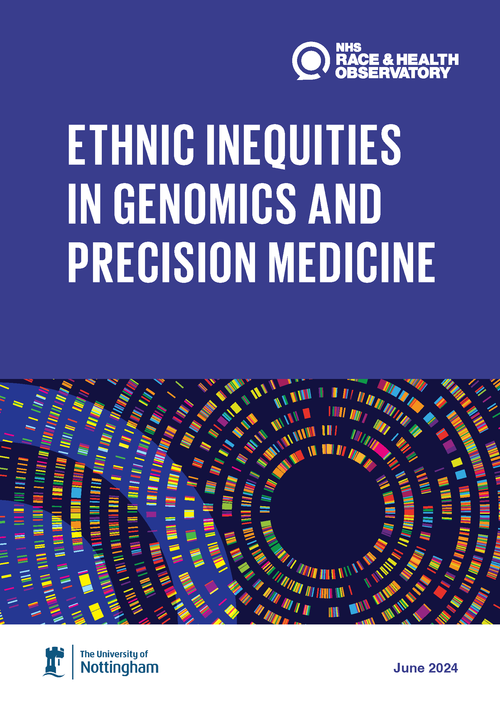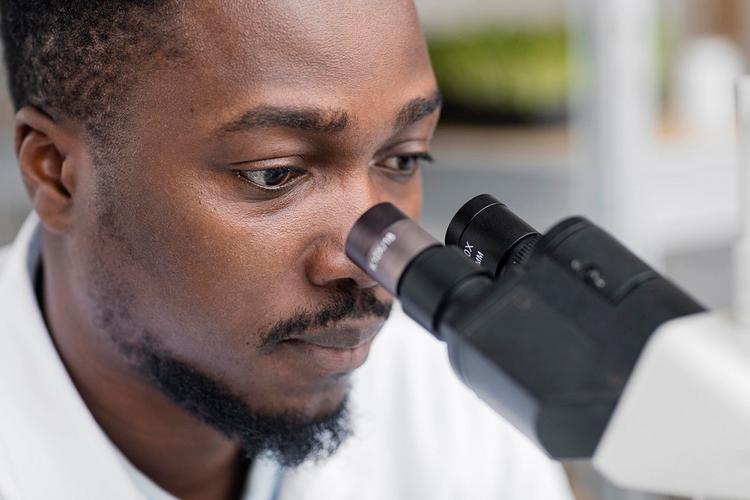- Published:
- 17 October 2024
- Author:
- Dr Veline L’Esperance and Professor Habib Naqvi
- Read time:
- 8 Mins
The NHS Race and Health Observatory is investigating ethnic inequality to ensure that the benefits of genomic medicine are enjoyed by patients of all backgrounds. This article explores its key findings.
The NHS Race and Health Observatory aims to address ethnic health disparities by producing evidence about racial and ethnic inequality in health, not only by commissioning original research to fill knowledge gaps, but also by synthesising and mobilising existing evidence. In turn, it uses the evidence it commissions to develop practical recommendations to support the implementation of policy and practice.
Precision medicine, which tailors medical treatments to individual genetic profiles, promises highly personalised healthcare that optimises therapeutic efficacy while minimising side effects. However, a significant issue within this evolving field is the underrepresentation of Black and ethnic minority groups in genomic and precision medicine research. This is compounded by inequities in access to genomic medicine services, which in turn exacerbate existing health inequalities. Addressing these disparities is crucial to ensure that all populations benefit from advancements in precision medicine.
Although genomic medicine is still a relatively new service within the NHS, we have found that the elements that reinforce ethnic health inequalities, including structural, institutional and interpersonal racism, are entrenched in this service, as they are in more established services, such as maternity care or mental health services. Therefore, embedding genomics medicine within the NHS not only signals the next big step in healthcare innovation, but also presents a real opportunity to instigate meaningful change early to ensure that not a single community is left behind.
Reviewing inequalities in genomics
To focus on these matters, the NHS Race and Health Observatory commissioned the University of Nottingham to undertake a review of ethnic inequities in genomics and precision medicine in the UK.1 This work further built on our seminal report, Ethnic Inequalities in Healthcare: A Rapid Evidence Review, which highlighted the inequities across a range of areas, including mental health care, digital access to healthcare and the NHS workforce.2 The review laid the foundations for our commitment to addressing ethnic health disparities in the fields of genomics and precision medicine.
Equitable access to genomic testing, particularly for cancer and rare, inherited and common diseases, is crucial for reducing health inequalities and enhancing patient outcomes across all communities. This article provides an overview of the report, its findings and recommendations. The full report is available here.

The review aimed to explore and understand ethnic inequalities within precision and genomic medicine. The specific objectives of this report were to:
- assess the current priorities to achieve ethnic health equity in precision and genomic medicine services by reviewing relevant policy and guidance documents
- identify ethnic disparities in recruitment for biomedical research and patient access to precision medicine through academic evidence synthesis
- determine the educational and service needs by evaluating stakeholders' knowledge, practices and perceived barriers and facilitators to accessing precision medicine services
- investigate equity in access and uptake of genomic testing by examining data recording practices by organisations of protected characteristics, such as ethnicity
- identify informational, educational and service needs to promote equitable access among individuals from diverse ethnic backgrounds by exploring their knowledge, attitudes and engagement with precision medicine.
The review used a mixed-methods approach, underpinned by the pragmatic paradigm. The methodology included:
- policy and guidance document review: a comprehensive review of UK-based policy and guidance documents to understand how ethnic inequities are acknowledged in precision and genomic medicine
- academic evidence synthesis: an analysis of academic literature to identify ethnic inequalities, focusing on recruitment biases in biomedical research and patient access to genomic services
- qualitative research: perspectives from various stakeholders, including clinicians, policymakers and community representatives, were gathered to understand current knowledge, attitudes and practices. Additionally, focus groups explored the views of individuals from different ethnic groups on their engagement with precision medicine.
Policy and guidance document review
The review analysed 70 documents from organisations involved in precision and genomic medicine, with 50 containing relevant information. The analysis revealed significant underrepresentation of ethnic groups in genomic datasets, which limits the understanding of genetic variation across different ethnicities and hinders the development of effective genomic medicine services. This underrepresentation negatively impacts the effectiveness of diagnostic tools, early detection and interventions for these populations.
Advanced analytic techniques, such as artificial-intelligence-based risk prediction tools, are also constrained by the lack of diverse genomic data, reducing their predictive utility for non-White populations. Efforts to engage diverse communities in genomic initiatives were often fragmented and lacked detailed acknowledgment in policy documents. Co-design and co-production were recommended, but practical implementation remains unclear. Educating ethnic minority communities on genomics and precision medicine is essential, but this requires adequate time and resources to enable informed contributions.
At the health service level, there is a need for better evaluation and monitoring of genomic services and initiatives. Increasing diversity within the healthcare workforce is key to overcoming historical barriers to access, such as mistrust among ethnic minority communities. Training healthcare professionals in cultural awareness and embedding diversity within clinical care guidelines were identified as positive steps that would reduce ethnic inequities in precision medicine. However, the specific content of such training needs further exploration, alongside increased public engagement with ethnic minority groups.
Improved collaboration among researchers, stakeholders, government bodies and public representatives, particularly from diverse ethnic groups, is necessary to address these issues.

Academic evidence synthesis
The systematic review aimed to explore ethnic inequalities in precision medicine, focusing on recruitment biases in biomedical research and patient access to genomic services. From 10,984 titles identified, 143 studies were included, with most relying heavily on the UK Biobank, resulting in similar data across multiple papers.
The genomic analyses of minority groups were rudimentary, with findings in the results sections rarely interpreted. Ethnic minorities were often treated as a covariate in multivariate analyses rather than a focus for identifying meaningful differences. Among studies that included ethnic minorities, 91.1% mentioned these groups in their results, with 78.5% performing statistical analysis involving ethnic minorities. The lack of ethnic minority data was frequently acknowledged as a limitation.
Qualitative studies revealed concerns among ethnic minority groups about providing samples for biobanking research, stemming from negative historical experiences with researchers. This reluctance raises questions about how these communities benefit from such research. Addressing ethnic health inequalities in precision medicine requires increasing ethnic minority representation in research, which will help bridge gaps and ensure equal access to genomic services.
Qualitative research
Semi-structured interviews were conducted with professional stakeholders to explore their knowledge, attitudes and practices in promoting access to genomic medicine for ethnic minority groups.
Additionally, participants from various ethnic minority groups, including Black African, Black Caribbean, Indian, Pakistani, Bangladeshi, Arab and mixed ethnicity backgrounds, took part in focus groups or interviews. Several themes emerged related to knowledge and awareness of genomics, barriers and facilitators to access and workforce training needs.
Knowledge and awareness of genomics and precision medicine varied widely among public stakeholders. Concerns were raised about healthcare professionals’ knowledge of these topics. Both public and professional stakeholders emphasised the need to improve knowledge and awareness across ethnic minority groups. Healthcare professionals were identified as key sources of information, while faith and community leaders were seen as crucial points of contact for disseminating information within ethnic communities. Tailored strategies and sustained messaging were highlighted as essential to improving engagement.
Barriers to accessing services included language challenges, mistrust, fear and suspicion of healthcare systems and research. Understanding and addressing the reasons for mistrust were seen as critical for improving engagement with genomic services and research.
Community engagement was consistently identified as key to improving equity of access and participation in research. Workforce training needs were also highlighted, with a focus on improving genomics education across the healthcare workforce. Cultural awareness and competency training for healthcare professionals and researchers were recognised as necessary, not only in genomics but across the healthcare system.
Our goal is to ensure that the findings from this report are translated into meaningful change. Therefore, we have proposed 6 key actionable recommendations to achieve equality in genetic medicine.
Meaningful community engagement
Government, relevant health authorities and research bodies should ensure diverse groups of patients and community groups are aware of and involved in discussions about NHS genetic medicine services.
Build trust
Understand the local population. Acknowledge the impact of past medical trials and reflect on the barriers that limit current research participation among Black, Asian and ethnic minority communities. Form diverse and meaningful partnerships, including with voluntary and charitable groups.
Ensure equitable access
Maintain consistent and comprehensive monitoring of patient access to NHS genetic medicine services. Take targeted action to ensure of access to services, including adequate provision of interpreters to translate complex medical language.
Share practical knowledge
Regular monitoring, evaluation and publication of projects by NHS England’s Genomics Policy Unit that aim to address inequities in genetic medicine services. Testing uptake must be routinely published and publicly accessible. Authorities, including the Genetic Medicine Service Alliance, must hold key stakeholders to account through regular monitoring and evaluation of action and implementation plans.
Diversify research participation
Governments, research bodies and funders must ensure that research databases hold genetic information that is representative of our diverse population, with more appropriate coding and recording of ethnicities. Increasing diverse representation of participants in genetic and precision medicine research studies should be prioritised.
Training and education
Government and healthcare organisations should routinely review work underway to increase the diversity of healthcare workers involved in genetic services, leadership positions and research delivery. Insights should be used to develop improved genetic medicine education for healthcare professionals that incorporates cultural awareness training that is relevant to diverse communities.
The review highlights the urgent need to address ethnic inequalities in precision and genomic medicine. Achieving equity in genomics and precision medicine requires a multifaceted approach, including increasing ethnic representation in research, improving access to genomic services, enhancing education and training for healthcare professionals and fostering community engagement.
Collaboration among researchers, healthcare providers, policymakers and community leaders is essential to ensure that all individuals, regardless of ethnicity, benefit from advancements in precision medicine. Without such efforts, existing health disparities are likely to persist and worsen, undermining the potential of precision medicine to improve health outcomes for all.
References available on our website.
Return to October 2024 Bulletin
Read next
Inequalities in cancer – an unequal burden
17 October 2024
A new strategy for the future
17 October 2024





